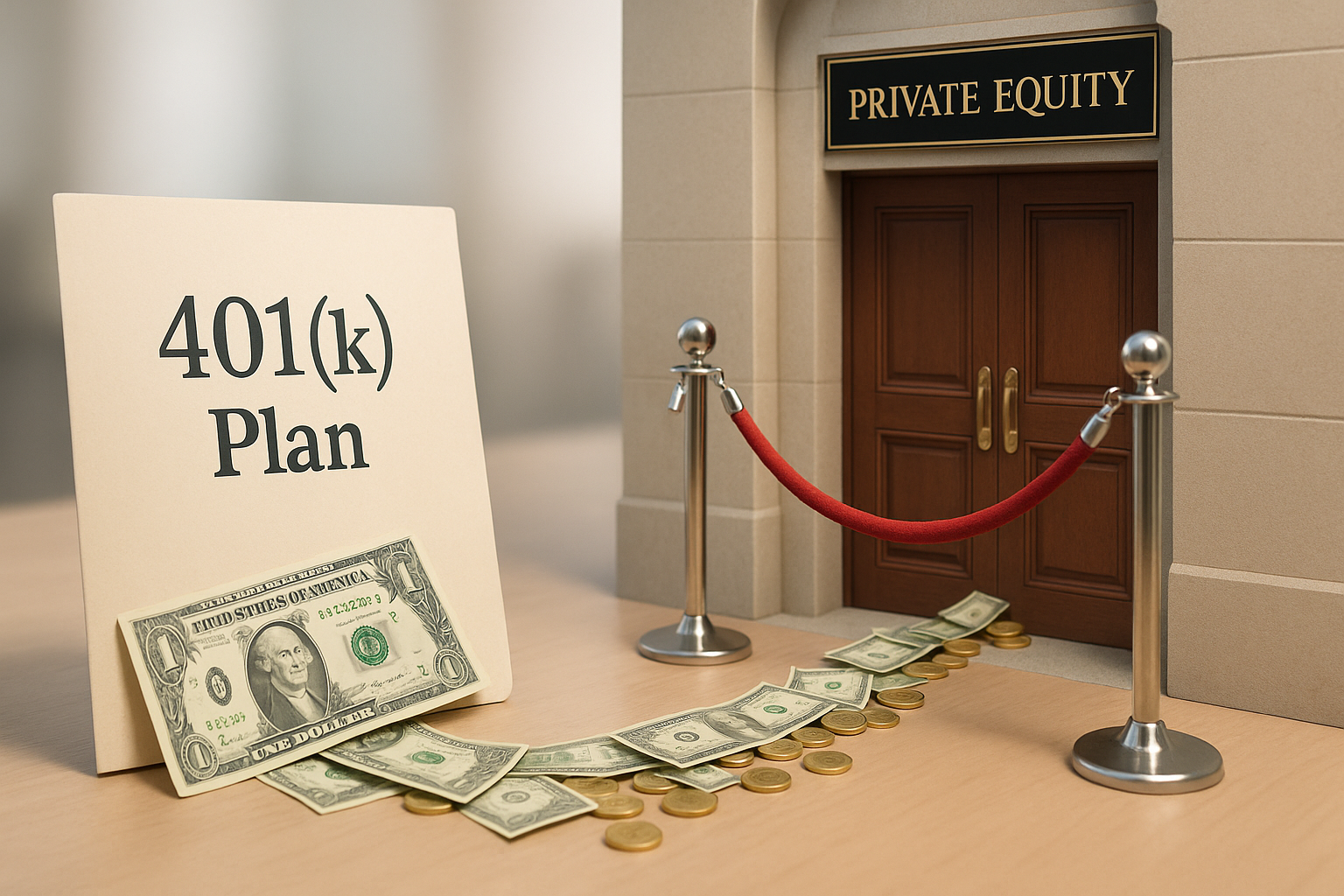The financial world's most exclusive club could be lowering its velvet rope.
In what might be the most significant shake-up to retirement investing in years, the Trump administration appears ready to let your 401(k) plan dabble in private equity investments. It's a move that has Wall Street salivating and retirement experts reaching for their blood pressure medication.
I've been tracking retirement policy changes for years, and this one's a doozy. The Department of Labor is reportedly about to issue guidance that gives retirement plan sponsors the green light to include private equity as part of diversified investment options – think target-date funds – without violating their fiduciary responsibilities under ERISA.
So what's the big deal? Well, private equity has long been the financial equivalent of that restaurant where you can't get a reservation unless you know somebody who knows somebody. These funds buy companies, often load them with debt, restructure them (sometimes brilliantly, sometimes with all the subtlety of a chainsaw), and sell them at a profit.
The returns? Pretty darn impressive. About 14% annually over 25 years, beating the S&P 500's roughly 10%. But here's the thing – these investments have typically been reserved for the already-wealthy and institutions, with minimum buy-ins that would make your eyes water.
Meanwhile, America's retirement landscape has undergone a seismic shift. Remember pensions? Yeah, those are going the way of the dinosaur. The 401(k) – where you, dear worker, must become your own investment guru – now reigns supreme.
What we're witnessing is a collision of powerful forces. Private equity firms are sitting on mountains of cash – about $1.5 trillion in "dry powder" – and they're hungry for more. The $6.2 trillion sitting in America's 401(k) accounts? That's not just money. That's stable, long-term capital that makes PE executives weak in the knees.
Look, the argument for adding private equity to retirement portfolios isn't completely bonkers. These investments could potentially juice returns and offer diversification benefits. God knows we could use the help – the typical 401(k) participant in their 40s has a measly $22,217 saved, according to Vanguard's data. (Yes, you read that right. Twenty-two thousand dollars to fund decades of retirement. Yikes.)
But – and this is a whopper of a "but" – there are serious red flags here.
Private equity typically locks up your money for 7-10 years. That's problematic for 401(k) participants who might switch jobs, face financial emergencies, or panic sell during market turbulence (and trust me, they will). The fee structure? It's a head-spinner – often 2% management fees plus 20% of profits. And transparency? Let's just say it's not their strong suit.
There's also the inconvenient truth that while PE has historically beaten public markets, that outperformance has been shrinking faster than a wool sweater in hot water. Some researchers argue that after accounting for leverage and illiquidity, the returns aren't actually that special.
The timing here is... interesting. This move comes as the private equity industry faces increasing heat from Democratic presidential candidates and progressive lawmakers. Elizabeth Warren's "Stop Wall Street Looting Act" proposed putting some serious handcuffs on the industry. Opening private equity to 401(k) investors could be seen as an attempt to build a broader constituency before the regulatory hammer potentially falls.
What we're seeing is part of a bigger trend toward "democratizing" finance – giving regular folks access to investment products once reserved for the country club set. We've seen similar movements with hedge funds, venture capital, and private real estate.
The question nobody seems to be asking: Does this democratization actually help Main Street, or is it just expanding Wall Street's hunting grounds?
From what I understand, the regulatory guidance will include significant guardrails. Private equity would be limited to diversified vehicles like target-date funds rather than offered as standalone options. That makes sense – most 401(k) participants have about as much expertise evaluating private equity deals as I do performing neurosurgery.
For plan sponsors, this creates a whole new level of complexity. They'll need to develop expertise in evaluating PE offerings or hire advisors who have it. And participants? They'll need clear education about these investments without being bamboozled by rosy return projections based on past performance that, as we're constantly reminded, may not repeat.
In the end, this development highlights the fundamental tension in our retirement system: we've made individuals responsible for their own retirement security without necessarily giving them the tools, knowledge, or options to succeed at this monumentally difficult task.
The private equity industry will be popping champagne corks when this announcement drops, no doubt about it.
Whether 401(k) participants should join the celebration? That remains to be seen.




